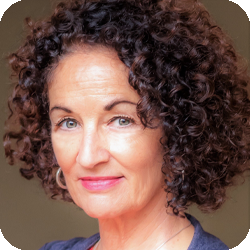2023 Lifetime Achievement Award 
Cathy L. Hasson, Ed.D.
Co-Lead, Institutional Effectiveness Strategic Enrollment Management (SEM) Project,
CCCCO and The RP Group;
Former Director of Institutional Research and Planning,
San Diego Community College District
With over 30 years of experience in higher education—primarily in California but also in Texas and Washington—Dr. Cathy L. Hasson’s career is deeply founded in the organizational development training she received from her doctoral program and her experiences in the California Community Colleges system.
Cathy’s studies began in bilingual/bicultural education at Cabrillo College, where she received an associate degree, and then she received her bachelor’s degree in English/linguistics from San Francisco State University. She went on to receive her master’s degree in education with a specialization in teaching English to speakers of other languages (TESOL) from California State University, Fullerton, and later completed her doctorate in organizational leadership at Pepperdine University.
At the beginning of her career, Cathy spent 13 years teaching English as a second language (ESL) at colleges and universities in the Southern California area. She stepped out of education for several years to pursue her interests in research and began working for market research and educational assessment companies, where she learned about survey research and assessment.
As an institutional research, planning, and organizational development professional, Cathy has provided significant contributions to the field. She was Director of Institutional Research, Planning, and Grants at Saddleback College from 1995 to 2005 and then Dean of Planning, Research, and Institutional Effectiveness at Skyline College from 2005 to 2008. While at these institutions, she excelled at building effective research infrastructures that enhanced efficiencies and data integrity and expanded information capacity. She served as the Director of Institutional Research and Planning at San Diego Community College District (SDCCD) from 2008 to 2018, where she oversaw the research function for the district, mentoring a large team of researchers, as well as installing research offices at the four colleges.
Cathy was also the lead designer and technical consultant in building information capacity for California community colleges through the Hewlett-funded 2009-2011 Bridging Research, Information, and Culture (BRIC) Initiative. This groundbreaking work was ahead of its time, spanning topics from institutional effectiveness to the assessment of student services outcomes. To this day, IRPE professionals reference materials from the BRIC initiative that Cathy co-led.
As a seasoned research, planning, and strategic enrollment management professional, Cathy has also served as an institutional research and effectiveness consultant and interim director of institutional research for numerous colleges including Moreno Valley College, Clark College in Vancouver, Washington, and Eastfield College in Dallas, Texas, where she participated in the statewide Success by the Numbers initiative. She has also served as a strategic enrollment management planning consultant for the Peralta Community College District, Fullerton College, and Fresno City College. In addition, Cathy has been a strategic and master planning consultant for Compton College, City College of San Francisco, and Coastline College.
Cathy has facilitated survey research, focus groups, and assessment workshops for the Basic Skills Initiative Network and the California SLO Collaborative. She has presented and facilitated sessions for The RP Group, the Association for Institutional Research, the California Association for Institutional Research, and the Community College League of California. Cathy also served on The RP Group’s Board of Directors for three separate terms: 2002-2004, 2006-2010, and 2010-2012. Cathy continues to be involved in instruction as an instructor and chair of the Institutional Research Certificate Program at the University of California, San Diego.
For the past eight years, Cathy has been the co-lead and a core team member for the Strategic Enrollment Management (SEM) Project, a collaboration between The RP Group and the California Community Colleges Chancellor’s Office. Through this project, Cathy has designed, developed, and implemented numerous SEM resources for community colleges including a set of SEM resource guides, a series of eight SEM webinars, and the SEM Academy for colleges. She has also served multiple times as a SEM coach for various colleges in the year-long SEM Program.
Cathy’s legacy includes advancing research, planning, and institutional effectiveness, which has led to a significant impact for the institutional research and planning community and the California Community Colleges system overall. In her professional roles as an administrator, consultant, instructor, facilitator, presenter, and trainer, Cathy has served as an inspirational mentor to many IRPE professionals and others in the field. We are pleased to celebrate her leadership with the 2023 RP Group Lifetime Achievement Award.